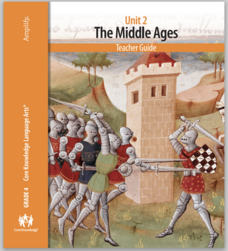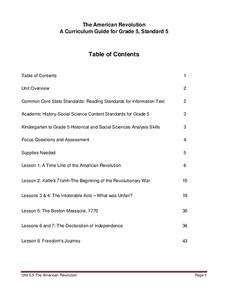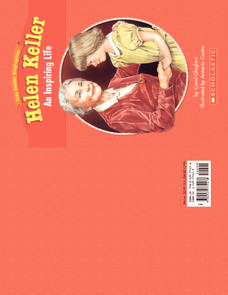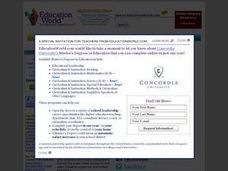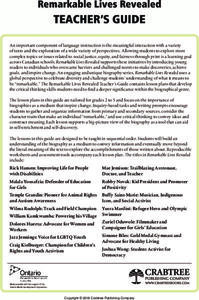Core Knowledge Foundation
Unit 6: American Revolution
The American Revolution is the theme of a five-week unit that focuses on reading, grammar, morphology, and writing. Scholars read and respond to texts, practice spelling and word work, and write paragraphs. Assessments gauge comprehension.
Core Knowledge Foundation
Unit 2: The Middle Ages
Over four weeks, fourth graders read and discuss texts about the Middle Ages. They practice vocabulary, spelling, and grammar, such as nouns, adjectives, and verbs. Writing opportunities allow learners to boost their note-taking skills...
California State University
The American Revolution
Invite your class on a ride through the American Revolution. Young historians travel through time as they explore the events that led to the foundation of the United States of America. Over the course of eight lessons, this unit...
Scholastic
Making Judgments Practice
Encourage young learners to identify persuasive writing techniques in a text with this resource, which includes two multiple-choice worksheets with advertisements for learners to analyze.
Scholastic
Helen Keller: An Inspiring Life (Biography Mini-Book)
Inspire young readers with this printable biography of Helen Keller. Including a timeline, glossary, and realistic illustrations with supporting captions, this is a great resource for not only teaching children about this amazing...
Institute of Electrical and Electronics Engineers
Exploring at the Nanoscale
Nano-nano! Nanotechnology can seem like it's from another planet! After learning about this tiny technology, collaborative groups experiment with how smaller particles affect chemical reactions. They do this by immersing a whole and a...
Institute of Electrical and Electronics Engineers
Working with Watermills
In collaborative groups, emerging engineers or environmental scientists plan and construct a water wheel or watermill that rotates for a total of three minutes. Everything you need to carry out this lesson is included: objectives,...
Curated OER
Working on the Slant
Compare and contrast a major news story from various newspapers. How does the perspective change? Are certain things included in some of the stories and left out of others? Have pupils complete a graphic organizer to compare how...
Bonneville
Informative Writing: Where Does Energy Come From?
Get energized about all the different sources of energy. A research project has scholars investigate a renewable or non-renewable energy type of their choice. They write a report on their findings and decide on a way to publish their work.
Academy of American Poets
The Immigrant Experience
The Buttonhook by Mary Jo Salter is the focus of a unit that explores the immigration experience to Ellis Island. First, scholars bring in an artifact that represents their heritage. A group-exercise allows them to share and discuss...
Crabtree Publishing
Remarkable Lives Revealed
Six lessons make up a unit all about biographies. Scholars read about a remarkable life while taking notes and identifying characteristics of the biographical genre. Readers examine the tale's obstacles, accomplishments, and sequence of...
Children’s Hospital of Philadelphia
Meet the Germs
A lesson introduces scholars to the scientist, Martinus Beijerinck, the person behind virus discovery. Learners research and complete a graphic organizer that showcases the differences between a virus and bacteria. Small groups share...
Children’s Hospital of Philadelphia
Meet the Heros
Vaccine development is the focus of a instructional activity that explores its history, timeline, and how the scientific method aids the process. Following a discussion about Edward Jenner and Small Pox, learners answer questions in...
Teaching Tolerance
Activism Online
People can make a difference in the world without leaving their homes. Using an eye-opening resource, scholars complete a handout as they consider the strengths and weaknesses of the Internet as a tool for social activism. Finally,...
Teaching Tolerance
Sensible Consumers
Girls like pink and boys like blue. Working in small groups, learners discuss stereotypes about children in advertisements. Then, scholars create their own manifestos about how they plan to respond to the consumer market they see in...
US Department of Commerce
Apportionment: Grades 3-4
Apportionment is a big word for young pupils. Use a helpful cartoon video and worksheet with data set to help them understand how the census fuels representative democracy. After examining how the census determines the number of seats a...
California Education Partners
Telescopes
An assessment challenges scholars to read an informative text then respond with an explanatory essay. The exam begins as participants read a text passage twice then take notes, making sure to jot down key details. Following the...
Water
Global Water Supply Elementary School Curriculum
Water is the focus of an interdisciplinary unit that brings awareness to its daily use around the world and the importance of conservation. Worksheets challenge scholars to match words and definitions, trace, complete a maze, and solve a...
Newspaper Association of America
Celebrating Women’s History Month
Examine the lives of four women—Blanche Stuart Scott, Madeleine L'Engle, Margaret Evans Price, and Sybil Ludington—in a 23-page activity packet. Each profile comes with a set of vocabulary and reading comprehension questions. Further...
Penguin Books
An Educator’s Guide to Savvy by Ingrid Law
Literature circles give learners a chance to explore a novel in a unique way. An educator's guide for the book Savvy uses literature circles as part of the novel study. Additional activities cover elements of figurative language and...
Newspaper Association of America
Community Connections with Geography and the Newspaper
Understanding geography and government begins at the local level. Using maps and the parts of a newspaper, a unit plan introduces the concept of community. It starts with the creation of classroom and school maps, and then moves through...
Fluence Learning
Writing About Informational Text: Everybody Can Bike
A three-part assessment challenges scholars to read informational texts in order to complete three tasks. Following a brief reading, class members take part in grand conversations, complete charts, and work in small groups to research...
Project WET Foundation
The Blue Planet
What a neat interactive that interacts with the amount of water on Earth's surface. It begins with a brief audio introduction of the Blue Planet and how it got its name. Then, users click on the activity to play a game...
Learning to Code Through Gameplay and Exploration 12-week Rotation for K-2
Through collaborative gameplay, students will learn the basic logic and sequencing concepts of coding. This process will also develop their skills in computational thinkingand problem solving.



